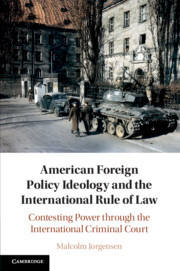Description
American Foreign Policy Ideology and the International Rule of Law
Contesting Power through the International Criminal Court
Author: Jorgensen Malcolm
Demonstrates American legal policymakers hold competing conceptions of the 'international rule of law' structured by foreign policy ideologies.
Language: English
Subject for American Foreign Policy Ideology and the International...:
Approximative price 31.58 €
In Print (Delivery period: 14 days).
Add to cart
American Foreign Policy Ideology and the International Rule of Law
Publication date: 05-2021
Support: Print on demand
Publication date: 05-2021
Support: Print on demand
American Foreign Policy Ideology and the International Rule of Law
Publication date: 01-2020
300 p. · 15.6x23.5 cm · Hardback
Publication date: 01-2020
300 p. · 15.6x23.5 cm · Hardback
Description
/li>Contents
/li>Biography
/li>
American engagement with international law has long been framed by commitment to the 'international rule of law', which persists even across divergent political and historical eras. Yet, despite appeals to legal ideals, American international law policy is consistently criticised as fraught with contradiction and distorted by beliefs in 'exceptionalism'. These contested claims of fidelity to law are the subject of this book: what does the 'international rule of law' mean for American legal policymakers even as they advocate competing commitments to international legal order? Answers are found in extensive evidence that American policymakers receive international law through established foreign policy ideologies, which correspond with divisions in both legal scholarship and diplomatic history. Using the case of the International Criminal Court, the book demonstrates that the very meaning of the international rule of law is structured by competing ideological beliefs; between American policymakers and global counterparts, and among American policymakers themselves.
Introduction; Part I. Ideology in American International Law Policy: 1. America's 'exceptional' international law policy; 2. The structure of American foreign policy ideology; 3. Competing conceptions of the international rule of law; Part II. Contesting Global Legal Power Through the ICC: 4. Clinton administration 1992–2000; 5. Bush 43 administration 2000–04; 6. Bush 43 administration 2004–08; 7. Obama administration 2008–16; Conclusion.
Malcolm Jorgensen is a Fellow at the Berlin Potsdam Research Group 'International Law: Rise or Decline?'. He holds a Ph.D. in International Law and American Foreign Policy from the University of Sydney, where he was a Research Associate at the United States Studies Centre and remains an Associate of the Sydney Centre for International Law. He formerly served in the Australian foreign ministry.
© 2024 LAVOISIER S.A.S.
These books may interest you

The Rule of Law in Global Governance 126.59 €



